|
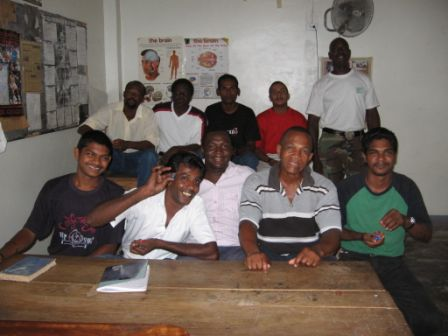
Men / Women in Recovery PHOENIX HOME & SALVATION ARMY: ( Above: Men in class at the Salvation Army. A similiar facility
is located at Phoenix Home in the northeast side of Georgetown ) Recovery in Guyana
(Contributing Editor: Bob Coltrin)
In very poor countries drugs and alcohol are readily available. In countries like Guyana the addiction rate is
very high and the avenues for recovery are few. Georgetown, Guyana is no exception to this, with the rate of addiction
being very high. There are two recovery centers in the country. They are The Salvation Army
Recovery Center and the Phoenix Recovery Center. Both facilities house about 10-12 men at a time.
|
CONTACT US: CLICK HERE
You
can help right now. Donations can be made by credit card [ VISA/Mastercard/AMEX or Discover Card ] by clicking on the PayPal
link ABOVE.
OR mail donation to: Heart for Guyana, c/o 128 Faith Ln., Bayfield, CO 81122 Rupununi Project
- Hope for the Disabled Hope for the Disabled is a mission focused
on helping Amerindian people with disabilities and their families lead healthy and productive lives. This program began in
2010 with an initial visit to Surama Village and has grown to include families from seven different villages in the North
Rupununi, Region 9 of Guyana. Hope for the Disabled is a project begun
by Dr. Vivian Carlson, a developmental psychologist, with the help of many colleagues from both the United States and Guyana.
Dr. Carlson has over 35 years of experience providing home-based services to people with disabilities and their families.
Colleagues from the fields of physical therapy, pharmacy, and medicine have joined Dr. Carlson in twice annual trips to the
Rupununi over the past 3 years. The Aircraft Owner’s Association of Guyana generously assists with Dr. Carlson’s
air transportation from Georgetown to the Rupununi and ground transport while traveling by river and road in Region 9. During our most recent trip in January, 2013 the Hope for the Disabled mission to increase
the health, wellbeing and community participation of persons with disabilities in the Rupununi was very enthusiastically received.
Families who have traditionally kept their relatives with disabilities out of sight are now asking for home visits as well
as bringing their family members to the local Health Clinics. In addition to assistance with caring for those with disabilities,
family members are now recognizing the need for learning and have begun requesting teaching materials for their loved ones
with disabilities. This is good news indeed as most of these children do not go to school. The highlight of this trip was the presentation of a custom built chair and table to a nine-year-old
boy with severe cerebral palsy. The young man who built the chair and table suffered a spinal injury over 18 years ago and
is a wheelchair bound paraplegic. Although he is confined to a wheelchair, this young man has become a master carpenter. A
detailed building plan with every part of the chair measured to the specific size for this little boy was sent to the carpenter.
He built a beautiful chair and matching table that enabled our little friend to sit upright securely and engage in a variety
of previously impossible learning activities. The photos below show the results of this remarkable local project:
All donations to the Rupununi Project - Hope for the Disabled mission
of the Heart for Guyana fund will be used for the purchase of adaptive equipment, first aid supplies, medications and learning
materials for Amerindian children and adults with disabilities.
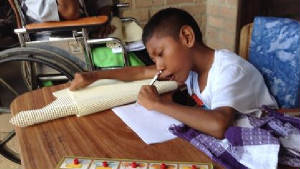 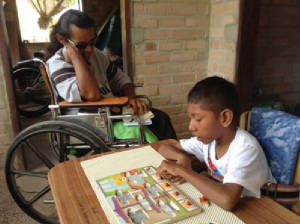 |
|
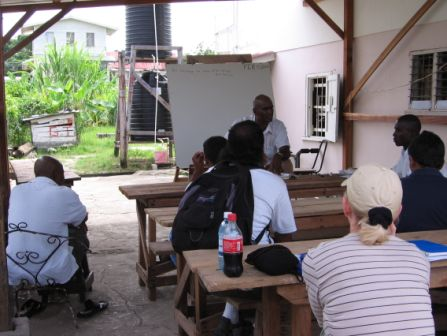
( Above: Outside
training area at Phoenix Home. There is no air conditioning at these locations. Georgetown is about 80 miles from the equator) The
length of the program varies according to the needs of each client. The Phoenix Recovery Center is a private pay facility
that houses both men and women in separate facilities. The men’s program has been going for many years hanging
on by the generous donations of mission teams and programs such as Heart for Guyana. They can house as many as 12 men
at a single time. They take care of complete room and board and provide detox from addiction and training and education
on how to stay clean and sober.
|
Red
Cross Food Program * * *
|
|
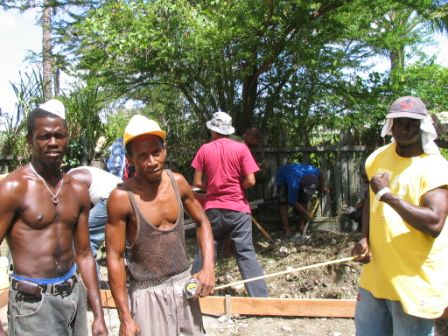
( Above: Men in the
program are given the opportunity to learn construction skills that hopefully they can use in the private sector when they
leave the program ) The Women’s facility of the Phoenix Recovery Center just opened its doors the
13th of August 2008. It is the first and only women’s treatment facility in all of Guyana. It was started
in partnership with the Phoenix Recovery Center, the Catholic Relief society and the US State Department. The facility
has a capacity to house up to 12 women at one time. The money received from the partners covers some of the cost but
not all of them. The cost of meals for the female clients must be obtained elsewhere. All recovery
centers depend on private donations to keep the doors open.
|
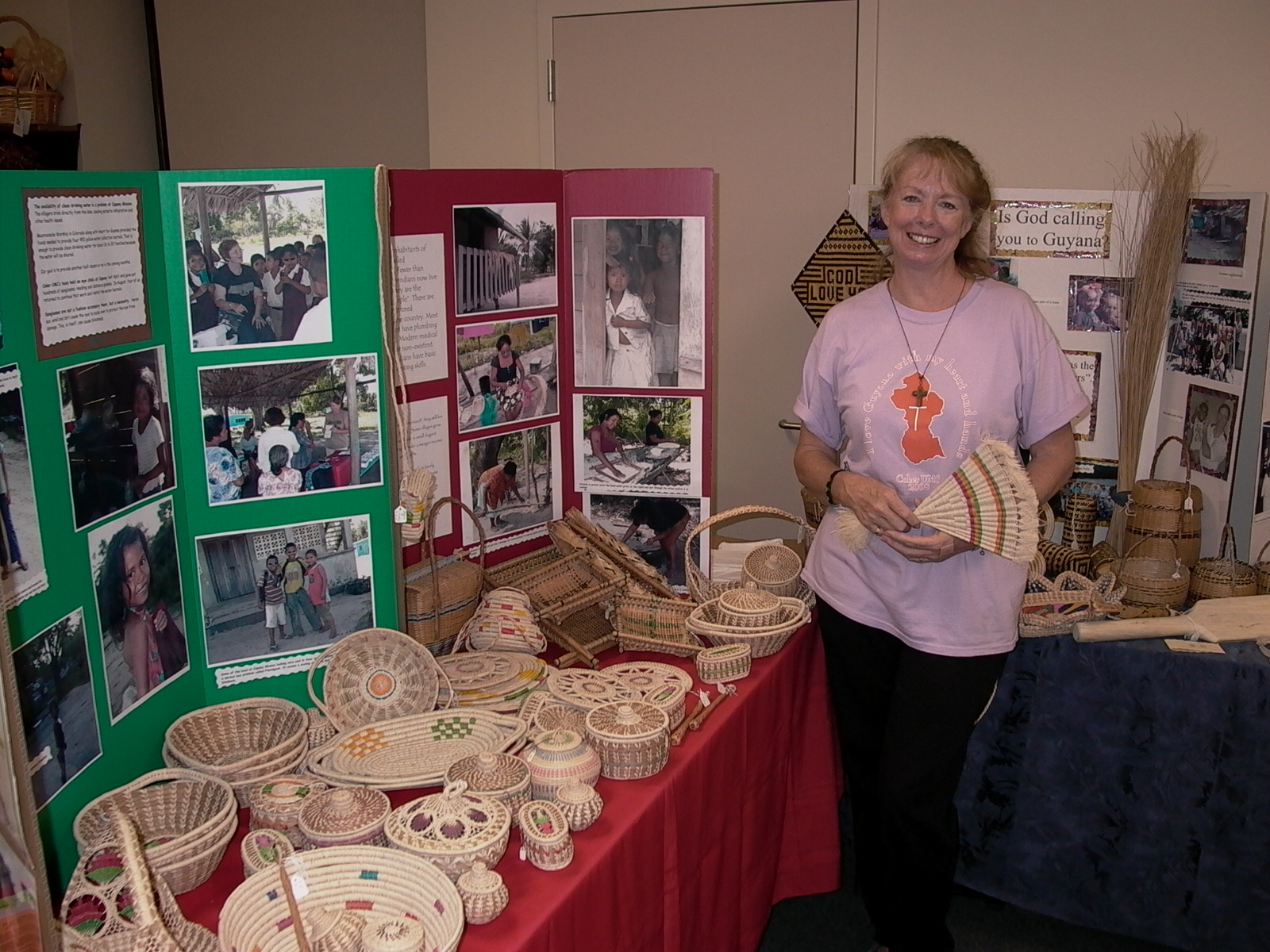
Fund Raising Ideas....... November 1, 2008, Debra Baker, San Antonio
set up a booth at the Coker UMC Cokerfest to sell baskets, made by Amerindians in Guyana. Debra purchases the baskets while in Guyana on mission trips from the Amerindian
shop and directly from several Amerindian villages. She then resales them at events like this and to friends. 100% of the proceeds then is used
again on her next mission trip to Guyana to buy additioanl baskets from the Amerindians. Other friends of Guyan sell arts & craftsand hold bake sales while
many find many other innovative ways to help fund mission projects in Guyana' Send
us your ideas and ways you've helped; we'd be happy to publish them here.... and send photo's too! Thank You |
|
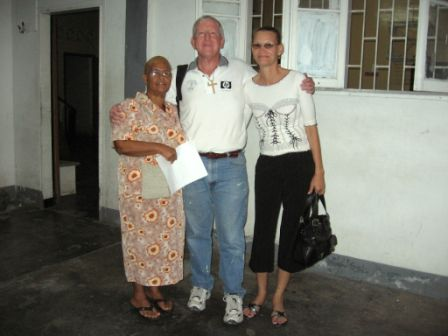
( Above: Bob Coltrin, member of Coker UMC Team, is
seen with Joan Alleyne and Karen Gomes. Bob and Debbie Miller, also with Coker UMC and these women were instrumental in beginning
the first AL-NAR program in Guyana )
Throughout Georgetown there are many Narcotics Anonymous, Alcohol Anonymous meetings; and because of the support people on
mission trips offer, there is now one support meeting in all the country. That meeting called AL-NAR (The Alcoholic/Narcotic
Family Support Group) offers hope to families of those addicted by giving them a source of strength through caring and sharing.
They have been in existence since March 2006. Through their personal contributions they are able to help family
members with financial troubles at some times.
The Phoenix recovery center has worked hard to establish an out placement
team of recovering addicts to work in the community doing construction work. Because of the nature of the disease of
addiction relapses many times play havoc on the best of plans. This group know as the “A” team was very
instrumental in the building of the Rumsveldt Children’s Home and Care Center. They have also assisted in many
other projects around Georgetown to help them and others as they all work to live life the way God intended. Giving
back to the community is a powerful way for alcoholics and addicts in recovery to stay sober and clean. There are absolutely no avenues
to obtain literature in any of the programs, so most of the needs are met when mission teams bring them. Cost of literature
is usually obtained by asking similar groups in the United States for assistance. When the groups in Guyana receive
a pamphlet or book, they Xerox it and hand that out to all newcomers. The men of Phoenix Recovery
Center go to the local schools and talk about the evils of drug and alcohol addiction. They compose rap songs and sing them
to help kids better relate to the perils of doing drugs. This giving of time doing service work is critical to their recovery. |
|